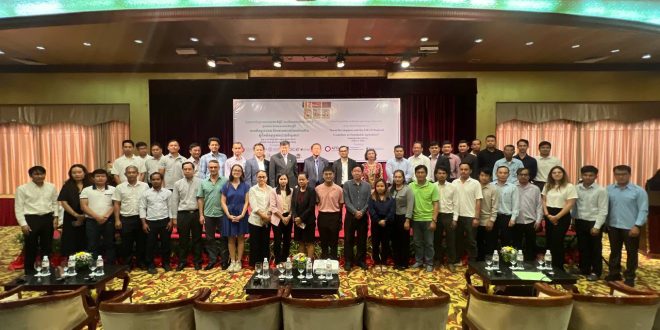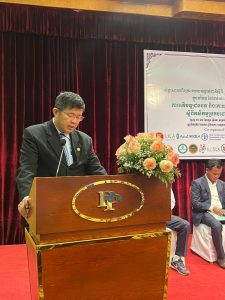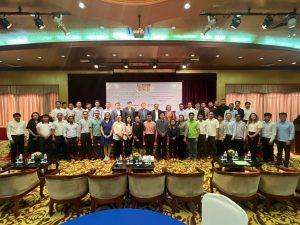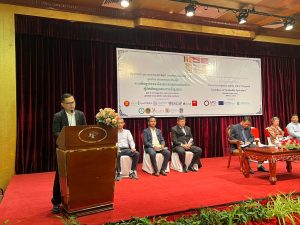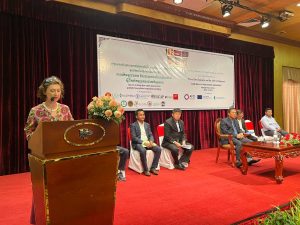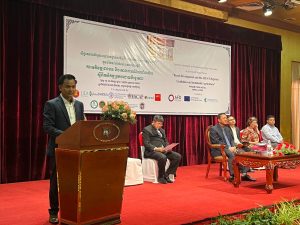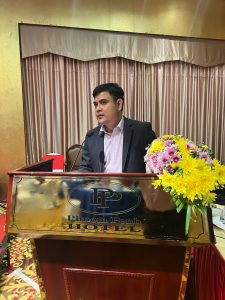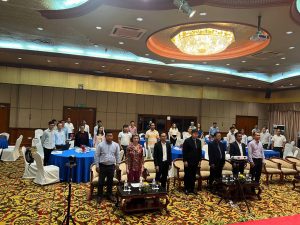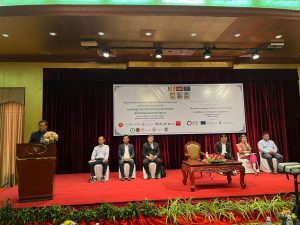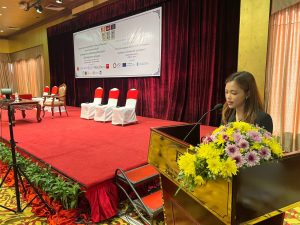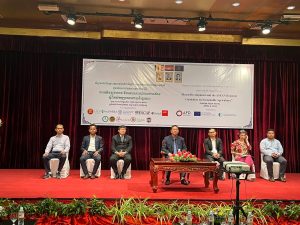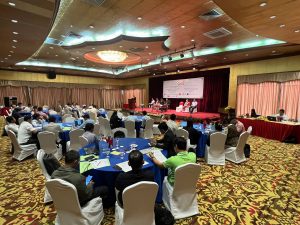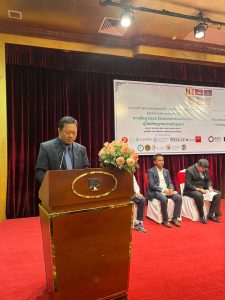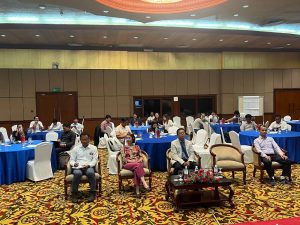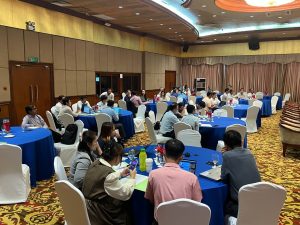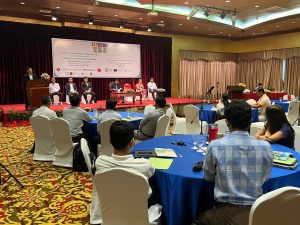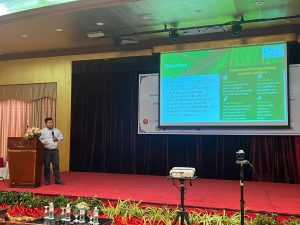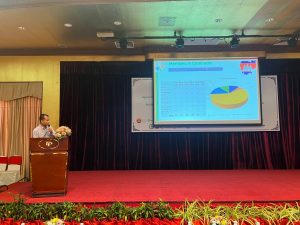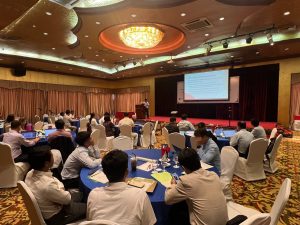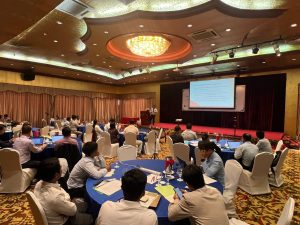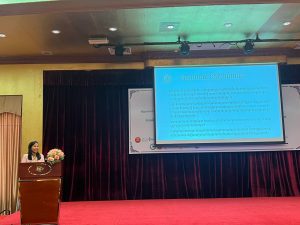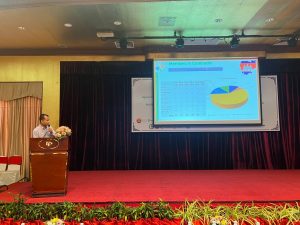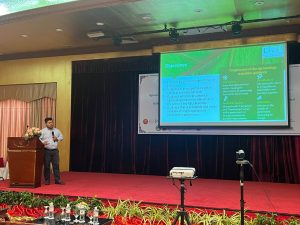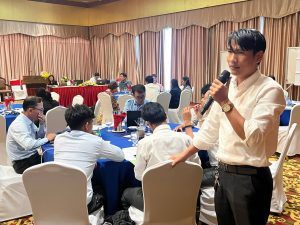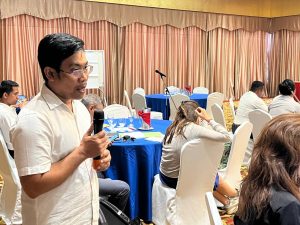Monday, April 8, 2024, CamboDHRRA on behalf of AsiaDHRRA, in collaboration with stakeholders including SOMRDPE and SOM-AMAF / ASEAN, ASEAN Working Group on Crops (ASWGC) ), CASIC, GRET, ALiSEA, DPA, LICA, with support from FAO, UNESCAP, CIRAD, the Agroecol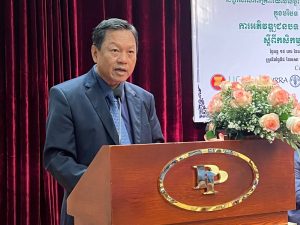 ogy and Safe Food System Transitions (ASSET) project, and development partners, as well as other stakeholders, organized a National Consultation to Promote Agroecology in the context of the ASEAN Master Plan on “Rural Development and the ASEAN Regional Guidelines on Sustainable Agriculture”. The workshop was chaired was chaired by H.E Dr. Sao Chivoan, Secretary of State, Ministry of Rural Development and SOMRDPE Focal Point, H.E Dr. Chan Saruth, Undersecretary of State, Ministry of Agriculture, Forestry and Fisheries and Chairman of the Executive Committee of the Conservation Agriculture and Sustainable Intensification Consortium (CASIC); Dr. Ly Prayuth, Assistance of FAO Representative in Cambodia; Dr. Raphaelle Ducrot, Representative, International Center for Agronomy Research for Development (CIRAD) and ASSET Project; Mr. Nuon Tum, Representative of Board of Directors of CamboDHRRA; Mr. Phi chhin, LICA National Focal Point and Mr. Thol Buntha, Representative of ALiSEA Council and also attended by representatives from ASEAN secretariate, AsiaDHRRA (online), representatives of national and international organizations and development partners including EU, AFD, SDC and Representatives from the public and private sectors, civil society organizations, higher education institutions, research institutes, representatives of farmers and agricultural cooperatives, a total of participants 57 persons including 15 women.
ogy and Safe Food System Transitions (ASSET) project, and development partners, as well as other stakeholders, organized a National Consultation to Promote Agroecology in the context of the ASEAN Master Plan on “Rural Development and the ASEAN Regional Guidelines on Sustainable Agriculture”. The workshop was chaired was chaired by H.E Dr. Sao Chivoan, Secretary of State, Ministry of Rural Development and SOMRDPE Focal Point, H.E Dr. Chan Saruth, Undersecretary of State, Ministry of Agriculture, Forestry and Fisheries and Chairman of the Executive Committee of the Conservation Agriculture and Sustainable Intensification Consortium (CASIC); Dr. Ly Prayuth, Assistance of FAO Representative in Cambodia; Dr. Raphaelle Ducrot, Representative, International Center for Agronomy Research for Development (CIRAD) and ASSET Project; Mr. Nuon Tum, Representative of Board of Directors of CamboDHRRA; Mr. Phi chhin, LICA National Focal Point and Mr. Thol Buntha, Representative of ALiSEA Council and also attended by representatives from ASEAN secretariate, AsiaDHRRA (online), representatives of national and international organizations and development partners including EU, AFD, SDC and Representatives from the public and private sectors, civil society organizations, higher education institutions, research institutes, representatives of farmers and agricultural cooperatives, a total of participants 57 persons including 15 women.
The one-day national consultations aim to:
• Socialize key ASEAN instruments – the ASEAN Master Plan on Rural Development and the ASEAN Regional Guidelines on Sustainable Agriculture in ASEAN – as starting points for building strategies and actions in support of food systems transformation through sustainable agriculture and agroecology transitions;
• Generate inputs from national stakeholders on the on-going effort to develop an ASEAN Policy Guidelines on Agroecology;
• Provide an inclusive space for family farmer organizations and civil society to participate in shaping policy agenda and programming in support of their work at local and national levels; and
• Catalyze potential multi-stakeholder partnerships and mechanisms needed to sustain the process of developing impactful plans and actions for sustainable agriculture and agroecology, and food systems transformation.
In conclusion, the National Consultation to Promote Agroecology within the context of the ASEAN Master Plan on Rural Development and the ASEAN Regional Guidelines on Sustainable Agriculture has been a significant step towards advancing sustainable agricultural practices and rural development in the ASEAN region.
Throughout this consultation, stakeholders from diverse backgrounds have come together to exchange ideas, share experiences, and propose actionable recommendations. By aligning with the ASEAN Master Plan on Rural Development and adhering to the ASEAN Regional Guidelines on Sustainable Agriculture, participants have demonstrated their commitment to integrating agroecology principles into policy frameworks at both national and regional levels.
The consultation has provided a platform for dialogue and collaboration, fostering partnerships and knowledge exchange among stakeholders. Through this collective effort, we have identified synergies and opportunities to promote agroecology as a key driver of sustainable rural development within ASEAN member states.
Moving forward, it is imperative that inputs generated during this consultation will consolidate with other countries for developing ASEAN policy guideline on Agroecology.
 Cambodhrra Cambodian Partnership for Development Human Resource in Rural Area Association
Cambodhrra Cambodian Partnership for Development Human Resource in Rural Area Association
